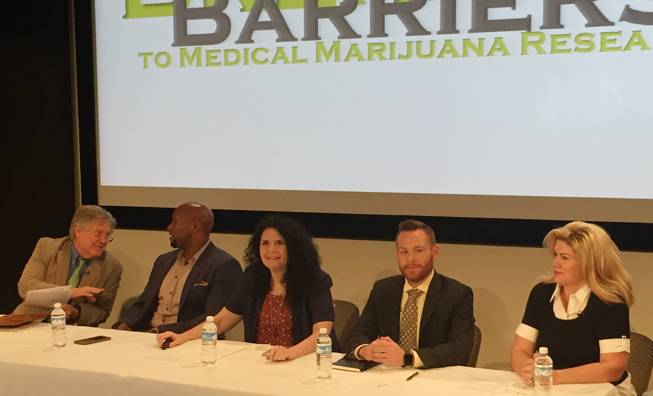
From left to right, Nevada state Sen. Tick Segerblom, Baltimore Ravens offensive tackle Eugene Monroe, Dr. Sue Sisley, medical director of the Grove dispensaries, John Hudak of the Brookings Institution and Nevada state Sen. Patricia Farley sit on a medical marijuana symposium panel at UNLV on Wednesday, May 25, 2016.
Wednesday, May 25, 2016 | 5:06 p.m.
A panel of medical marijuana advocates is calling for more research into how the plant works in treating various diseases and conditions.
“Hundreds of thousands of people medicate every day using marijuana,” Brookings Institution scholar John Hudak said today during a symposium at UNLV’s Hank Greenspun School of Journalism and Media Studies auditorium.
“They’re self-medicating; they’re self-dosing; they’re taking guesses of cannabinoids, of what kind of strains are going to help them,” said Hudak, the institution’s deputy director of the Center for Effective Public Management. “A lot of times it’s a trial-and-error process.”
Hudak joined state Sens. Tick Segerblom and Patricia Farley, Dr. Sue Sisley, medical director of The Grove dispensaries in Nevada, and Baltimore Ravens offensive tackle Eugene Monroe on a panel titled Breaking Barriers to Medical Marijuana Research.
The event, which was open to the public, brought in about 200 attendees, many of them medical marijuana activists.
More than 165 million Americans live in states where medical marijuana is legally available, Hudak said. But with so little research on marijuana’s potential medical benefits, even doctors are “left in the dark” in assessing which strain of marijuana best suits a patient’s needs.
“The longer we go without legitimate answers, it’s an absolute embarrassment,” Hudak said to cheers and applause. “It puts patients at risk and makes them waste money on strains they’re not even sure will help them.”
“If you really think marijuana is terrible, let science show it,” he said.
Sisley noted that per U.S. Food and Drug Administration regulations, marijuana is more difficult to research than other Schedule 1 drugs such as LSD, MDMA, ecstasy and bath salts.
While studying other drugs requires approval from the FDA, the Drug Enforcement Administration and the Institutional Review Board, marijuana researchers also need approval from the U.S. Public Health Service and National Institute on Drug Abuse.
Getting those extra OKs can take six to 10 years, making some research projects obsolete by the time they are approved, she said.
“There are myriad ways in which the U.S. government has systematically defeated marijuana efficacy research” Sisley said. “It’s classic federal government overreach, and it’s unnecessary.”
Unlike other drugs, marijuana used for research must come from National Institute on Drug Abuse-funded labs at the University of Mississippi, and they are not representative of the countless marijuana sources across the country, Sisley said.
“It’s an injustice to block this kind of research,” Sisley said. “Research would be far more efficient if this NIDA monopoly didn’t exist.”
Monroe, who has played in the NFL since 2009, said marijuana — its use is banned by the league — should be allowed to help players deal with pain and brain trauma.
Monroe, who said he has suffered four documented concussions during his eight-year NFL career, lines up with teammates before games to get an injection of popular pain-killer Toradol in the team’s locker room. He’s also been prescribed hydrocodone, oxycodone and Celebrex, among other drugs, to deal with pain.
Marijuana is a “less dangerous and addictive solution to chronic pain management” than opioids and anti-inflammatory drugs, said Monroe, who leads the Gridiron Cannabis Coalition, which is seeking NFL approval of medical marijuana.
“We’re prescribed these dangerous pharmaceuticals much more than the average person,” he said. “It develops addictions that don’t stop after football.”
Farley, who was elected in 2014 to the Nevada Senate, said she wants to see critical medical marijuana research conducted in the state.
“If anybody can get this right, it’s Nevada,” she said. “When people think about the medical marijuana industry, it’ll be as world-class as the Nevada gaming industry.”

Join the Discussion:
Check this out for a full explanation of our conversion to the LiveFyre commenting system and instructions on how to sign up for an account.
Full comments policy